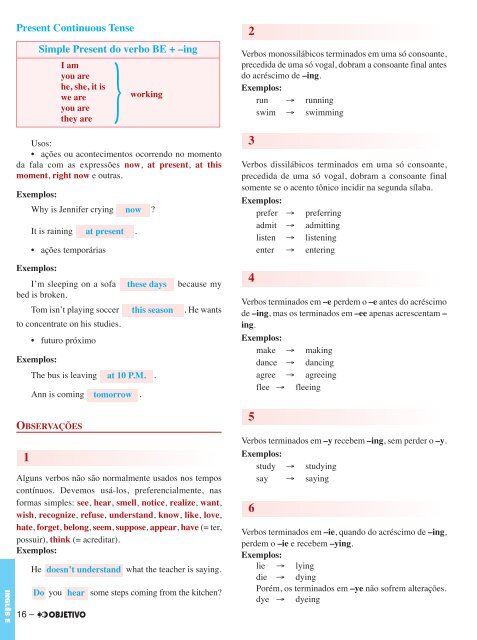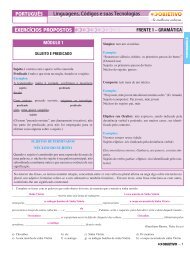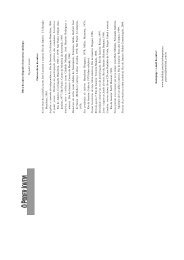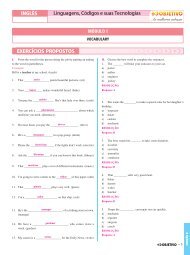1 - No-IP
1 - No-IP
1 - No-IP
Create successful ePaper yourself
Turn your PDF publications into a flip-book with our unique Google optimized e-Paper software.
INGLÊS E<br />
Present Continuous Tense<br />
Usos:<br />
• ações ou acontecimentos ocorrendo no momento<br />
da fala com as expressões now, at present, at this<br />
moment, right now e outras.<br />
Exemplos:<br />
Why is Jennifer crying now ?<br />
It is raining at present .<br />
• ações temporárias<br />
Exemplos:<br />
I’m sleeping on a sofa<br />
bed is broken.<br />
these days because my<br />
Tom isn’t playing soccer<br />
to concentrate on his studies.<br />
this season . He wants<br />
• futuro próximo<br />
Exemplos:<br />
The bus is leaving at 10 P.M. .<br />
Ann is coming tomorrow .<br />
OBSERVAÇÕES<br />
1<br />
Alguns verbos não são normalmente usados nos tempos<br />
contínuos. Devemos usá-los, preferencialmente, nas<br />
formas simples: see, hear, smell, notice, realize, want,<br />
wish, recognize, refuse, understand, know, like, love,<br />
hate, forget, belong, seem, suppose, appear, have (= ter,<br />
possuir), think (= acreditar).<br />
Exemplos:<br />
16 –<br />
Simple Present do verbo BE + –ing<br />
I am<br />
}<br />
you are<br />
he, she, it is<br />
we are working<br />
you are<br />
they are<br />
He doesn’t understand what the teacher is saying.<br />
Do you hear some steps coming from the kitchen?<br />
2<br />
Verbos monossilábicos terminados em uma só con soante,<br />
precedida de uma só vogal, dobram a consoante final antes<br />
do acréscimo de –ing.<br />
Exemplos:<br />
run → running<br />
swim → swimming<br />
3<br />
Verbos dissilábicos terminados em uma só consoante,<br />
precedida de uma só vo gal, dobram a consoante final<br />
somente se o acento tônico incidir na segunda sílaba.<br />
Exemplos:<br />
prefer → preferring<br />
admit → admitting<br />
listen → listening<br />
enter → entering<br />
4<br />
Verbos terminados em –e perdem o –e antes do acrés cimo<br />
de –ing, mas os terminados em –ee apenas acres centam –<br />
ing.<br />
Exemplos:<br />
make → making<br />
dance → dancing<br />
agree → agreeing<br />
flee → fleeing<br />
5<br />
Verbos terminados em –y recebem –ing, sem perder o –y.<br />
Exemplos:<br />
study → studying<br />
say → saying<br />
6<br />
Verbos terminados em –ie, quando do acréscimo de –ing,<br />
perdem o –ie e recebem –ying.<br />
Exemplos:<br />
lie → lying<br />
die → dying<br />
Porém, os terminados em –ye não sofrem alterações.<br />
dye → dyeing









